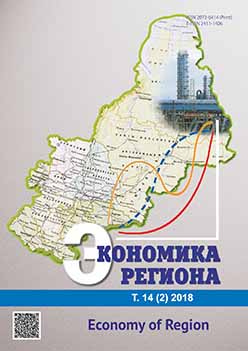Обеспечение российского агропромышленного комплекса высококвалифицированными кадрами в условиях перехода к зеленой экономике
Providing the Russian Agro-Industrial Complex With Highly Qualified Personnel in the Context of the Global Transition to a «Green Economy»
Author(s): Anna Antonovna Anfinogentova, Mikhail Nikolayevich Dudin, Nikolay Vasilievich Lyasnikov, Oleg Dmitrievich ProtsenkoSubject(s): Economy
Published by: Институт экономики Уральского отделения Российской академии наук
Keywords: agro-industrial complex; “green economy”; ecological responsibility; sustainable development; personnel potential; triple helix model; corporative training; highly-qualified personnel; integrated syst
Summary/Abstract: The transition to new business conditions in the agro-industrial sector puts forward new requirements for staffing. High qualification of workers in agribusiness is one of the main conditions for creating a platform for the transition from industrialization to environmentally responsible economic growth. However, few existing training and retraining programs for the agro-industrial sector allow to provide the labour market by specialists whose professional competencies include an environmentally responsible context. Therefore, it is necessary to consider the opportunities and prospects for reforming educational programs to train highly qualified specialists for the Russian agro-industrial complex. This article is based on a content analysis of research, economic and statistical data that reliably characterize trends and tendencies in the development of the Russian agro-industry at the present time. One of the most rational approaches to provide the Russian agro-industrial sector with highly qualified human resources, which possess competences in environmentally responsible organization of activities can be based on the Triple Helix Model. The information presented in the article has allowed to make the following main conclusions. Firstly, the environmentally responsible development of the economy as a whole, as well as of its separate sectors, spheres, as well as of the social sector, is the basic condition for the physical survival of modern civilization. Secondly, in the Russian system of training personnel for the agro-industrial sector, the concept of environmentally responsible and innovative-oriented education has not been systematically implemented. Therefore, in practice, the agrarian regions of Russia urgently need skilled personnel with the appropriate level of professional competence in resource-efficient nature management. These conclusions can be used as at the macroeconomic level for the elaboration of development programs of the Russian agro-industry, and at the microeconomic level for the improvement of ways and approaches to corporate training. Within this article, we did not specify the modern techniques of the personnel training and the development of personnel capacity in agro-industriy. This aspect will become a subject-mater for our further research.
Journal: Экономика региона
- Issue Year: 14/2018
- Issue No: 2
- Page Range: 638-650
- Page Count: 13
- Language: Russian

